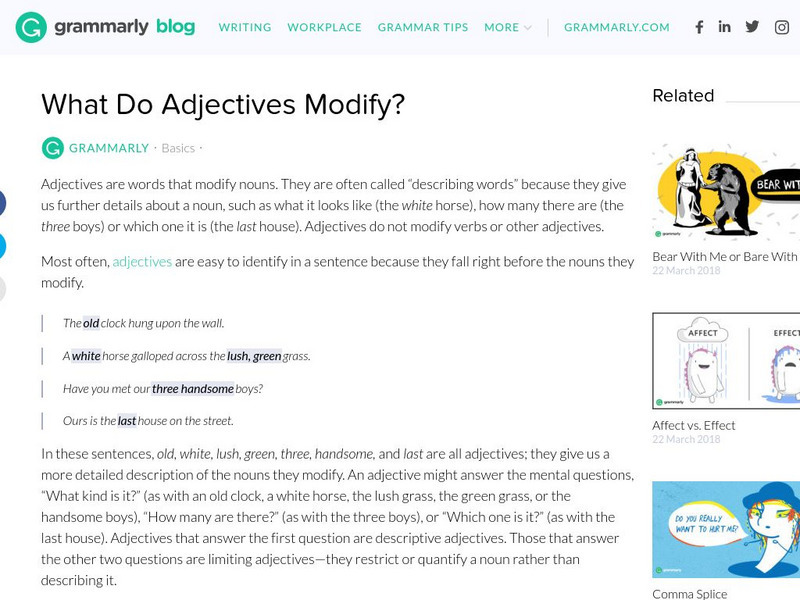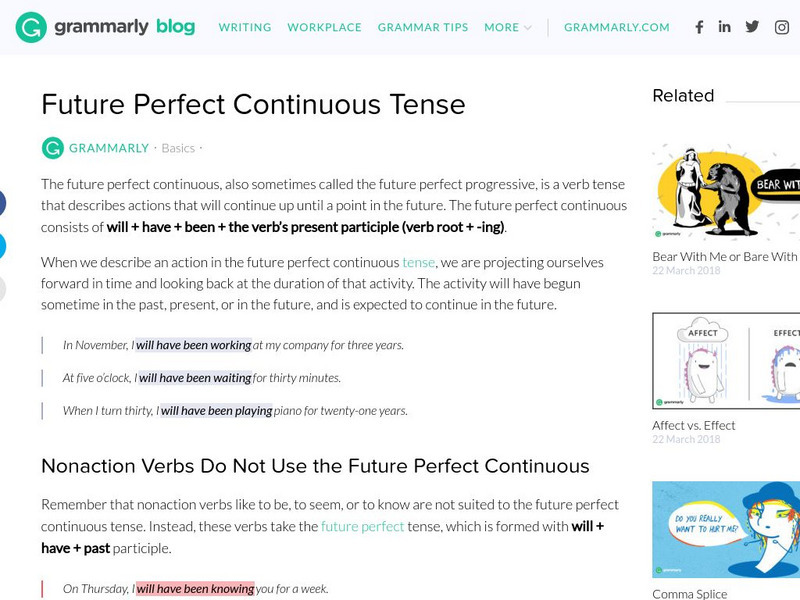Grammarly
Grammarly Blog: Quotations Within a Quotation
Rules and examples for using quotation marks within a quotation.
Grammarly
Grammarly Blog: Hyphen in Compound Adjective With High or Low
Rules and examples for using a hyphen when adding the prefixes high- or low-.
Grammarly
Grammarly Blog: Hyphen in Compound Adjective With Numbers
Rules and examples for using hyphens when writing numbers that act as compound adjectives.
Grammarly
Grammarly Blog: Each and Every
This page explains the proper use of the singular words "each" and "every" and provides examples.
Grammarly
Grammarly Blog: Such as Comma
This Grammarly Handbook resource provides information about comma rules related to the phrase such as in a sentence. Examples of such as in non-restrictive clauses are included.
Grammarly
Grammarly Blog: Ellipsis
This page focuses on the ellipsis including what it is, what it means, how to use it, and examples of its use.
Grammarly
Grammarly Blog: Hyphen in Compound Numbers
Rules and examples for using a hyphen when writing compound numbers. L.11-12.2a Hyphens
Grammarly
Grammarly Blog: Consistent Point of View
This Grammarly Handbook resource reminds students how to write with a consistent point of view. Examples are provided to demonstrate how to fix a sentence that contains an inconsistent point of view.
Grammarly
Grammarly Blog: Oxford Comma
Rules and examples for using a comma before the conjunction in a list.
Grammarly
Grammarly Blog: What Do Adjectives Modify?
This blog article explains that adjectives modify nouns and provides examples. It also discusses predicate adjectives.
Grammarly
Grammarly Blog: Verb Tense Consistency: Grammar Rules
This page focuses on the need for verb tense consistency on a clause level. It is important to maintain the same verb tense in a clause; if the time changes, use a second sentence.
Grammarly
Grammarly Blog: Pronoun Case
An explanation with examples of subjective, objective, and possessive case pronouns.
Grammarly
Grammarly Blog: Future Perfect Continuous (Progressive) Tense
This page explains what future perfect continuous (progressive) tense means and how it is formed; examples are provided.
Grammarly
Grammarly Blog: Colon
This page focuses on the colon and provides links to five sets of rules for colon use and misuse with appropriate examples.
Grammarly
Grammarly Blog: Colon Use
This page explains the rules for using a colon in a series and to separate one idea from another and offers examples.
Grammarly
Grammarly Blog: Colon Between Independent Clauses
This page explains the use of a colon between two closely related independent clauses in a sentence when the emphasis is on the second clause. Examples are provided.
Grammarly
Grammarly Blog: Colon:independent Clause & List, Quote, Appositive, Idea
This page explains the use of a colon when an independent clause is followed by a closely-related dependent clause that clarifies or gives more information about the independent clause. Examples are show with lists, quotes, appositives,...
Grammarly
Grammarly Blog: Other Uses of Colon
Rules and examples for using colons when writing time, chapter and verse, dialogue, and business letters.
Grammarly
Grammarly Blog: Misuse of Colon
Rules and examples of commonly made usage errors with a colon.
Grammarly
Grammarly Blog: Qualifiers and Quantifiers
An explanation and examples of how qualifiers and quantifiers are used in sentences. Links to additional information are provided.
Grammarly
Grammarly Blog: Abstract Nouns
This page explains that an abstract noun is not identifiable by any of the five senses and provides examples.
Grammarly
Grammarly Blog: Concrete Nouns
This Grammarly Handbook resource provides a definition for concrete nouns. Examples of concrete nouns in the context of sentences are provided.
Grammarly
Grammarly Blog: Lots or Plenty of and Singular Nouns
An explanation of how to use qualifying nouns like "lots" and "plenty" correctly in a sentence.

























